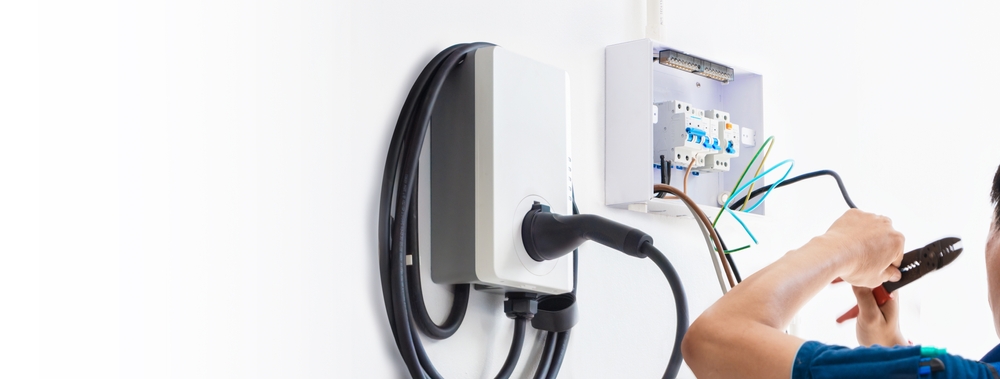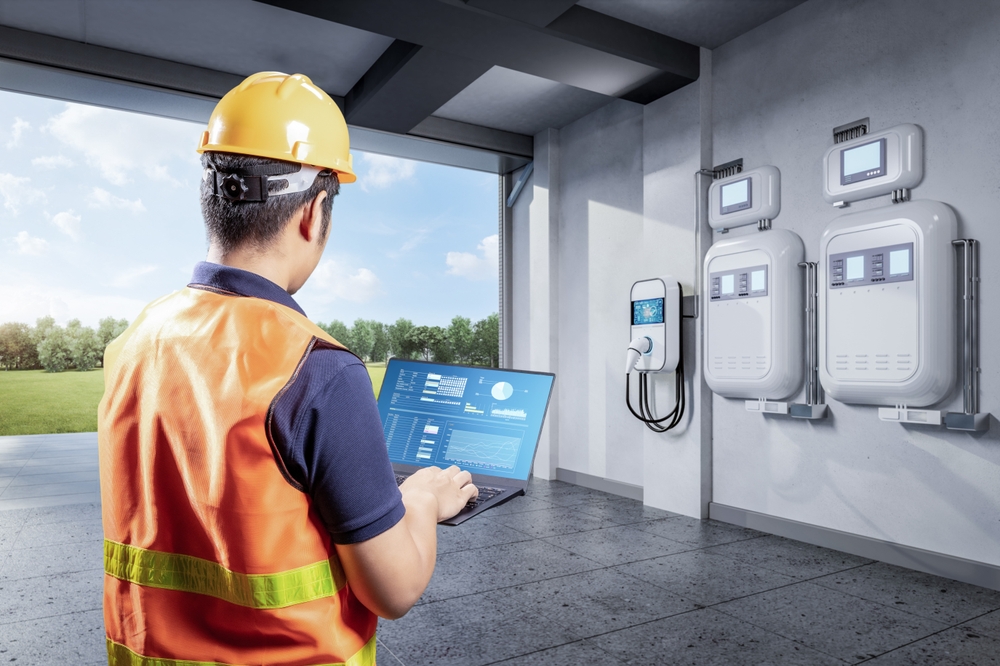Installing a home electric vehicle (EV) charging station can be a great investment, providing convenience and cost savings over time. Here are the key points you need to know:
1. Types of EV Chargers
- Level 1 Chargers:
- Uses a standard 120-volt outlet.
- Slow charging speed (typically adds 3-5 miles of range per hour).
- Suitable for plug-in hybrid vehicles or for those with short daily commutes.
- Level 2 Chargers:
- Requires a 240-volt outlet, similar to what is used for large appliances.
- Faster charging speed (typically adds 10-60 miles of range per hour).
- Ideal for all-electric vehicles and for users who drive long distances regularly.

2. Electrical Requirements
- Electrical Panel Capacity:
- Ensure your home’s electrical panel can handle the additional load of a Level 2 charger.
- A professional electrician may need to upgrade your panel.
- Dedicated Circuit:
- The charger should be installed on a dedicated circuit to avoid overloading the system.
3. Installation Costs
- Charger Unit Cost:
- Level 1 chargers are generally cheaper and often come included with the vehicle.
- Level 2 chargers can range from $300 to $1,200, depending on features.
- Installation Cost:
- Professional installation can cost between $200 and $1,000 or more, depending on the complexity and electrical upgrades needed.
4. Permits and Codes
- Local Permits:
- Check with your local government to see if you need a permit for the installation.
- Building Codes:
- Ensure the installation meets all local building codes and standards.
5. Charger Placement
- Location:
- Install the charger in a convenient location, typically in your garage or driveway.
- Weather Protection:
- Outdoor installations need weatherproof units or enclosures.
6. Smart Features
- Wi-Fi Connectivity:
- Some chargers offer Wi-Fi connectivity for monitoring and controlling charging remotely.
- Energy Management:
- Advanced chargers can manage energy use and provide detailed usage reports.
7. Incentives and Rebates
- Federal and State Incentives:
- Check for available tax credits, rebates, or grants that can offset installation costs.
- Utility Programs:
- Some utility companies offer incentives or lower electricity rates for EV owners.
8. Professional Installation
- Licensed Electrician:
- Always hire a licensed and experienced electrician to ensure safe and code-compliant installation.
- Inspection:
- An inspection by a local authority may be required to finalize the installation.
9. Ongoing Maintenance
- Regular Checks:
- Periodically inspect the charging station for wear and tear.
- Software Updates:
- Keep the charger’s software updated if it includes smart features.
10. Safety Considerations
- Surge Protection:
- Consider installing surge protection devices to protect your charger and home electrical system from power surges.
- GFCI Protection:
- Ground Fault Circuit Interrupters (GFCIs) may be required for safety, especially for outdoor installations.
- Fire Safety:
- Ensure that the charging equipment is certified by recognized safety organizations (e.g., UL listed).
11. Choosing the Right Charger
- Power Output:
- Match the charger’s power output to your vehicle’s onboard charger capabilities.
- Connector Type:
- Ensure the charger has the correct connector for your vehicle (most common is the SAE J1772 connector in North America).
- Cable Length:
- Consider the length of the cable to ensure it can reach your vehicle easily.
12. Environmental Impact
- Renewable Energy:
- If possible, pair your EV charger with a home solar power system to reduce your carbon footprint.
- Energy Efficiency:
- Look for chargers that are ENERGY STAR certified for better energy efficiency.
13. User Experience
- Ease of Use:
- Choose a charger with user-friendly features, such as easy-to-read displays and straightforward controls.
- Customer Support:
- Check the manufacturer’s reputation for customer support and warranty service.
14. Future-Proofing
- Scalability:
- If you plan to add more EVs in the future, consider a charging station that can support multiple vehicles or has the option to upgrade.
- Technological Advancements:
- Keep an eye on emerging technologies like bi-directional charging (V2G – Vehicle to Grid), which allows your EV to supply power back to the grid or your home.
15. Community and Neighborhood Considerations
- Shared Chargers:
- In multifamily housing or neighborhoods with shared parking, consider the logistics of shared charging stations.
- HOA Guidelines:
- If you live in a community governed by a Homeowners Association (HOA), check for any guidelines or restrictions on installing a charger.
16. Charging Etiquette
- Public Charging:
- When using public chargers, be mindful of others by not overstaying once your vehicle is fully charged.
- Sharing at Home:
- If sharing a charger with family members or neighbors, establish clear rules and schedules.
17. Maximizing Efficiency
- Charge During Off-Peak Hours:
- Many utility companies offer lower rates during off-peak hours. Set your charger to charge during these times to save on electricity costs.
- Energy Management Systems:
- Consider integrating your EV charger with a home energy management system to optimize energy use.
18. Educational Resources
- Manufacturer’s Guide:
- Thoroughly read the manufacturer’s installation and user guide for specific instructions and safety information.
- Online Resources:
- Utilize online forums, videos, and guides for additional tips and best practices.
19. Troubleshooting and Support
- Common Issues:
- Be aware of common issues such as connectivity problems, slow charging, or error messages on the charger.
- Manufacturer Support:
- Contact the charger manufacturer for troubleshooting assistance and support if issues arise.
- Warranty:
- Ensure your charger comes with a warranty and understand the terms for repairs or replacements.

20. Integrating with Home Automation
- Smart Home Systems:
- Integrate your EV charger with smart home systems like Amazon Alexa, Google Home, or Apple HomeKit for voice control and automation.
- Automated Charging:
- Use automation features to start charging based on your schedule, electricity rates, or renewable energy availability.
21. Monitoring and Analytics
- Usage Data:
- Track your charging sessions and electricity consumption through the charger’s app or interface.
- Efficiency Reports:
- Some chargers provide detailed reports on energy usage and efficiency, helping you optimize charging habits.
22. Environmental and Economic Benefits
- Reduced Emissions:
- Charging your EV at home, especially with renewable energy, significantly reduces your carbon footprint compared to traditional gasoline vehicles.
- Cost Savings:
- Home charging is generally cheaper than public charging stations and far less expensive than fueling a gasoline car.
23. Vehicle Compatibility
- Compatibility Check:
- Confirm that the charger you choose is compatible with your specific EV model.
- Updates:
- Keep an eye on software updates from your vehicle manufacturer that might enhance charging efficiency or compatibility.
24. Community and Local Resources
- Local Installers:
- Support local businesses by hiring local electricians who are experienced in EV charger installations.
- EV Communities:
- Join local EV clubs or online communities to share experiences and gain insights on home charging.
25. Future Innovations
- Wireless Charging:
- Stay informed about emerging technologies like wireless (inductive) charging, which could become more mainstream in the coming years.
- Battery Technology:
- Advances in battery technology may influence charging speeds and methods, so keep up-to-date with industry trends.
26. Insurance Considerations
- Home Insurance:
- Inform your home insurance provider about the installation of the EV charger to ensure it’s covered under your policy.
- Extended Warranties:
- Consider extended warranties for both the EV and the charger to protect your investment.
27. Energy Storage Integration
- Battery Storage Systems:
- Pair your EV charger with a home battery storage system to store energy from solar panels or during off-peak hours for use during peak times.
- Grid Independence:
- Enhance your home’s resilience to power outages by using your EV’s battery or a
- home storage system to power essential appliances.
28. Resale Value
- Home Value:
- Installing a home EV charger can increase the resale value of your property, as more buyers look for EV-ready homes.
- Future Buyers:
- Highlight the presence of a home EV charger when selling your home to attract environmentally conscious buyers.
Final Thoughts
Installing a home EV charging station is a valuable upgrade for any EV owner, offering the convenience of charging at home and the potential for cost savings. By understanding the different aspects of the installation process, from choosing the right charger to ensuring electrical compatibility and compliance with local codes, you can make informed decisions and enjoy a seamless charging experience. Remember to consider future needs, safety, and potential incentives to maximize the benefits of your investment.
